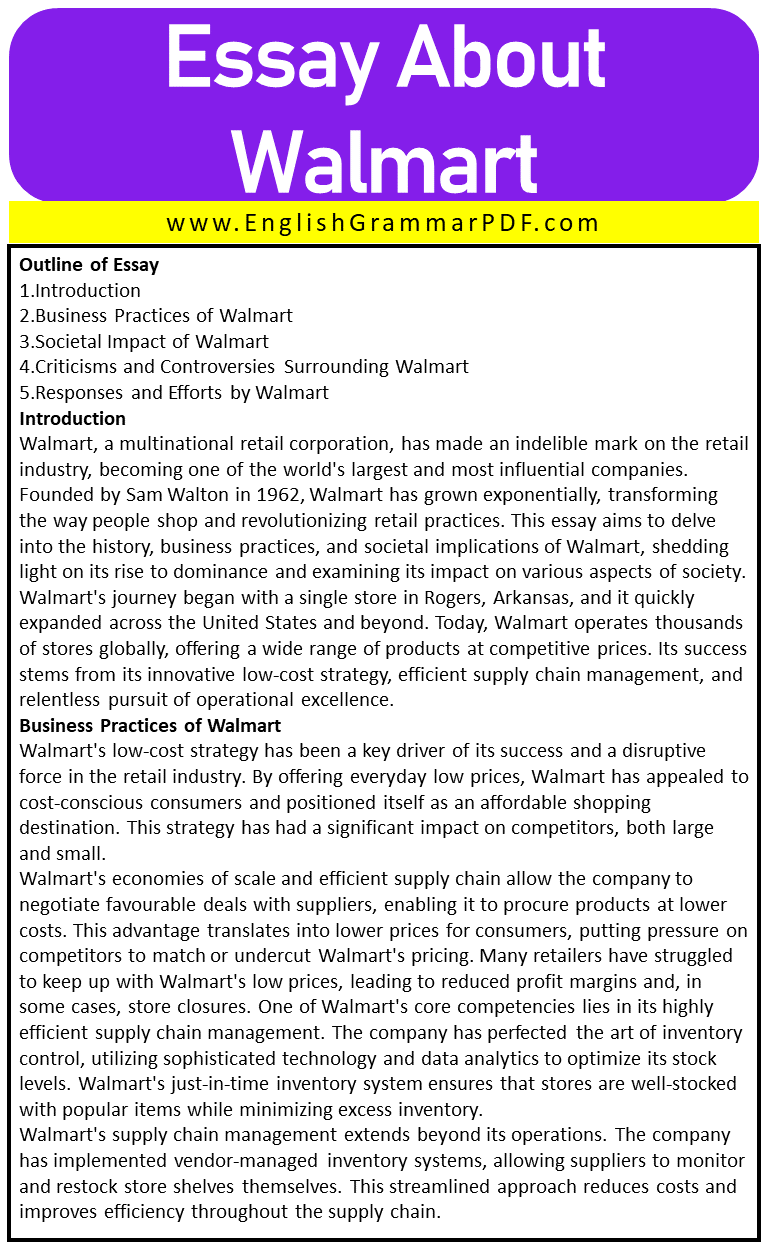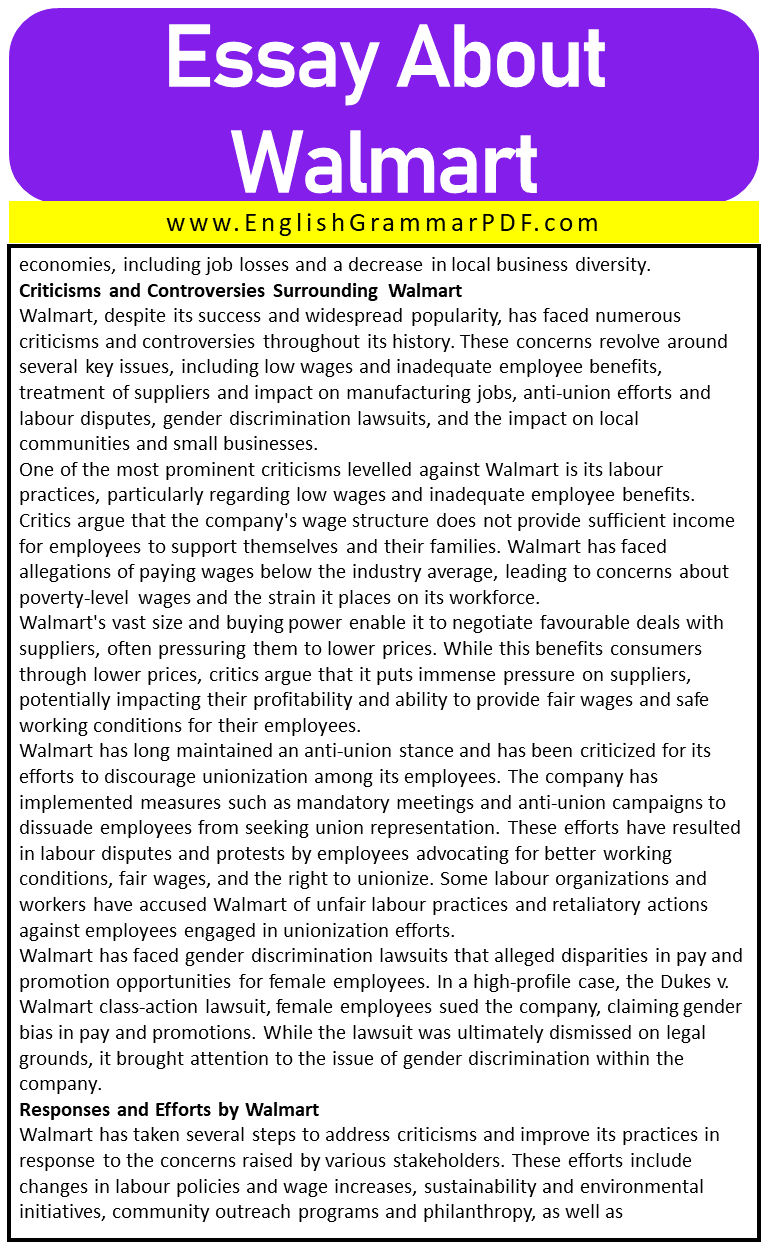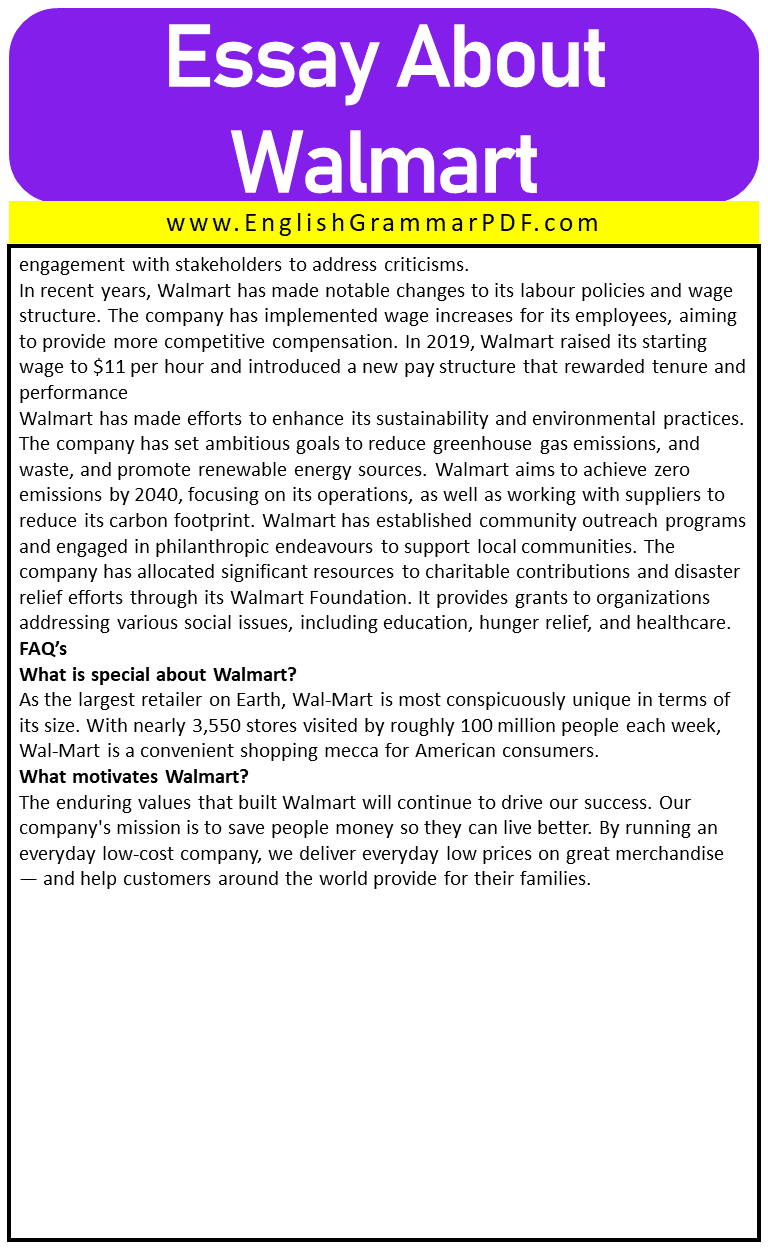Essay About Walmart
Outline of Essay
- Introduction
- Business Practices of Walmart
- Societal Impact of Walmart
- Criticisms and Controversies Surrounding Walmart
- Responses and Efforts by Walmart
Introduction
Walmart, a multinational retail corporation, has made an indelible mark on the retail industry, becoming one of the world’s largest and most influential companies. Founded by Sam Walton in 1962, Walmart has grown exponentially, transforming the way people shop and revolutionizing retail practices. This essay aims to delve into the history, business practices, and societal implications of Walmart, shedding light on its rise to dominance and examining its impact on various aspects of society.
Walmart’s journey began with a single store in Rogers, Arkansas, and it quickly expanded across the United States and beyond. Today, Walmart operates thousands of stores globally, offering a wide range of products at competitive prices. Its success stems from its innovative low-cost strategy, efficient supply chain management, and relentless pursuit of operational excellence.
Business Practices of Walmart
Walmart’s low-cost strategy has been a key driver of its success and a disruptive force in the retail industry. By offering everyday low prices, Walmart has appealed to cost-conscious consumers and positioned itself as an affordable shopping destination. This strategy has had a significant impact on competitors, both large and small.
Walmart’s economies of scale and efficient supply chain allow the company to negotiate favourable deals with suppliers, enabling it to procure products at lower costs. This advantage translates into lower prices for consumers, putting pressure on competitors to match or undercut Walmart’s pricing. Many retailers have struggled to keep up with Walmart’s low prices, leading to reduced profit margins and, in some cases, store closures. One of Walmart’s core competencies lies in its highly efficient supply chain management. The company has perfected the art of inventory control, utilizing sophisticated technology and data analytics to optimize its stock levels. Walmart’s just-in-time inventory system ensures that stores are well-stocked with popular items while minimizing excess inventory.
Walmart’s supply chain management extends beyond its operations. The company has implemented vendor-managed inventory systems, allowing suppliers to monitor and restock store shelves themselves. This streamlined approach reduces costs and improves efficiency throughout the supply chain.
Walmart’s employee relations have been a subject of scrutiny and controversy over the years. The company has faced criticism regarding its labour practices, including allegations of low wages, inadequate benefits, and challenging working conditions. Critics argue that Walmart’s wage structure does not provide sufficient income for employees to meet their basic needs. The company has faced accusations of paying wages that are lower than the industry average, leading to concerns about employee well-being and financial stability.
Walmart has historically maintained an anti-union stance, actively discouraging unionization efforts among its employees. The company has implemented measures to deter union formation, including mandatory meetings where employees are educated on the potential disadvantages of union representation.
As Walmart has grown and expanded, its presence has had a significant impact on small businesses and local economies. Walmart’s size and buying power enable it to negotiate lower prices with suppliers, making it difficult for smaller retailers to compete on price. Many small businesses have struggled to survive in the face of Walmart’s aggressive pricing strategies, leading to closures and job losses in local communities.
Societal Impact of Walmart
Walmart’s presence and operations have had a significant societal impact, spanning economic, environmental, and social dimensions. Understanding the implications of Walmart’s activities is crucial in assessing the overall effects of the company on communities and society at large.
One of the primary areas of impact is the economy. Walmart’s operations have created a substantial number of jobs, both directly within its stores and indirectly through its supply chain. The company is one of the largest employers globally, providing employment opportunities to millions of people. In particular, Walmart has been known to play a significant role in rural areas, where job opportunities may be limited. However, Walmart’s economic impact extends beyond job creation. The company’s aggressive pricing and vast product assortment have attracted a large customer base, resulting in substantial revenue and tax contributions. Walmart’s presence in local communities can also stimulate economic activity, as shoppers from surrounding areas may travel to Walmart stores, leading to additional spending in the community.
Despite these economic benefits, there are concerns about the effects of Walmart on local economies and small businesses. The company’s ability to offer lower prices and a wide range of products can put small retailers at a disadvantage, making it challenging for them to compete. This dynamic has led to the closure of numerous small businesses, which can have negative consequences for local economies, including job losses and a decrease in local business diversity.
Criticisms and Controversies Surrounding Walmart
Walmart, despite its success and widespread popularity, has faced numerous criticisms and controversies throughout its history. These concerns revolve around several key issues, including low wages and inadequate employee benefits, treatment of suppliers and impact on manufacturing jobs, anti-union efforts and labour disputes, gender discrimination lawsuits, and the impact on local communities and small businesses.
One of the most prominent criticisms levelled against Walmart is its labour practices, particularly regarding low wages and inadequate employee benefits. Critics argue that the company’s wage structure does not provide sufficient income for employees to support themselves and their families. Walmart has faced allegations of paying wages below the industry average, leading to concerns about poverty-level wages and the strain it places on its workforce.
Walmart’s vast size and buying power enable it to negotiate favourable deals with suppliers, often pressuring them to lower prices. While this benefits consumers through lower prices, critics argue that it puts immense pressure on suppliers, potentially impacting their profitability and ability to provide fair wages and safe working conditions for their employees.
Walmart has long maintained an anti-union stance and has been criticized for its efforts to discourage unionization among its employees. The company has implemented measures such as mandatory meetings and anti-union campaigns to dissuade employees from seeking union representation. These efforts have resulted in labour disputes and protests by employees advocating for better working conditions, fair wages, and the right to unionize. Some labour organizations and workers have accused Walmart of unfair labour practices and retaliatory actions against employees engaged in unionization efforts.
Walmart has faced gender discrimination lawsuits that alleged disparities in pay and promotion opportunities for female employees. In a high-profile case, the Dukes v. Walmart class-action lawsuit, female employees sued the company, claiming gender bias in pay and promotions. While the lawsuit was ultimately dismissed on legal grounds, it brought attention to the issue of gender discrimination within the company.
Responses and Efforts by Walmart
Walmart has taken several steps to address criticisms and improve its practices in response to the concerns raised by various stakeholders. These efforts include changes in labour policies and wage increases, sustainability and environmental initiatives, community outreach programs and philanthropy, as well as engagement with stakeholders to address criticisms.
In recent years, Walmart has made notable changes to its labour policies and wage structure. The company has implemented wage increases for its employees, aiming to provide more competitive compensation. In 2019, Walmart raised its starting wage to $11 per hour and introduced a new pay structure that rewarded tenure and performance
Walmart has made efforts to enhance its sustainability and environmental practices. The company has set ambitious goals to reduce greenhouse gas emissions, and waste, and promote renewable energy sources. Walmart aims to achieve zero emissions by 2040, focusing on its operations, as well as working with suppliers to reduce its carbon footprint. Walmart has established community outreach programs and engaged in philanthropic endeavours to support local communities. The company has allocated significant resources to charitable contributions and disaster relief efforts through its Walmart Foundation. It provides grants to organizations addressing various social issues, including education, hunger relief, and healthcare.
FAQ’s
What is special about Walmart?
As the largest retailer on Earth, Wal-Mart is most conspicuously unique in terms of its size. With nearly 3,550 stores visited by roughly 100 million people each week, Wal-Mart is a convenient shopping mecca for American consumers.
What motivates Walmart?
The enduring values that built Walmart will continue to drive our success. Our company’s mission is to save people money so they can live better. By running an everyday low-cost company, we deliver everyday low prices on great merchandise — and help customers around the world provide for their families.
Explore More Essays:
Download the PDF of the Essay:







